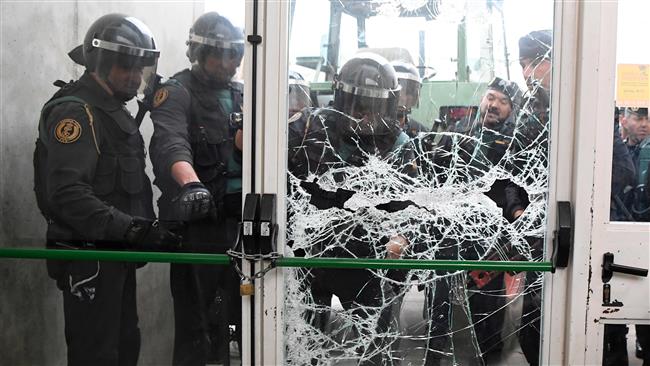Mild chaos as Catalans try to vote in banned referendum


People in Catalonia have begun attempting to vote at some schools and other facilities in Catalonia that have been designated as polling stations in a banned referendum on secession from Spain.
People began arriving before dawn to join the parents, children, and activists who had occupied the buildings, defying a judge’s order to vacate before the Sunday polling is supposed to begin.
Many Catalans spent the night in schools and began to set up polling stations in an attempt to vote in the banned referendum.

However, ballot boxes have not been seen at the polling stations.
The central government in Madrid has taken strict measures to prevent the referendum from effectively taking place. Over the past week, police have been conducting raids on venues where ballot papers and ballot boxes were believed to be kept. Police have also arrested Catalan officials, seized campaigning leaflets, sealed off many of the 2,300 schools designated as polling stations, and occupied the Catalan government’s communications hub.
In spite of the crackdown, or perhaps because of it, many people in Catalonia have been determined to hold the vote.
Authorities in Madrid have instructed police to ensure no votes are cast.
Still, it was unclear whether the referendum would go ahead in any meaningful way. A Spanish government source said on Saturday that police would physically remove voters from any polling stations.
Police smash their way into polling site
Meanwhile, Spanish riot police have smashed their way into a polling station in Catalonia where the region’s president, Carles Puigdemont, had originally been scheduled to vote in the disputed independence referendum.
Civil Guard riot police with shields used a hammer to smash the glass of the front door of the voting center in Sant Julia de Ramis, near Girona, and used lock cutters to force their way in.
Puigdemont cast his ballot on Sunday morning, images from TV3 television channel showed. He voted in the village of Cornella del Terri in the province of Girona, the regional government said, not in the village originally planned.
Scuffles erupted outside between police and people waiting to vote at the polling center. Police also reportedly fired rubber bullets to scatter people in a Barcelona street.
Television footage showed police using batons to disperse the crowds gathered outside the local sports center.
Riot police also clashed with voters outside a Barcelona voting station, where dozens of police used riot shields to push people back, a Reuters witness said.
Would-be voters chanted “We are people of peace” and “We are not afraid.”
By noon, Catalan Emergency Services said 38 people had been injured, mostly slightly, in clashes with riot police.
Half a dozen armored police vans and an ambulance stood ready nearby, the witness said.
The Spanish government says the referendum is illegal, and the country’s Constitutional Court has ordered the vote suspended. Separatist regional leaders have pledged to hold it anyway, and called on the 5.3 million “eligible” voters to show up for the poll.
The referendum is the biggest challenge in the region in decades and represents a test of will between Barcelona and Madrid, which is backed by Brussels.
People allowed to vote anywhere
Voters will be allowed to cast ballots at any polling station, rather than a designated one as previously announced, as many locations have been sealed off by police. Regional government spokesman Jordi Turull said that Catalans would be able to vote with ballots printed at home if needed.
He said that authorities had nevertheless printed new ones after five million paper ballots were confiscated by Spanish police. He also said that a group of “academics and professionals” would serve as election observers.
Police presence in Catalonia is substantial. Civil Guard national police reinforcements began deploying in the pre-dawn darkness in Barcelona, where about 100 police vans streamed into the streets from a port where they had been stationed, a Reuters witness said.
“I have got up early because my country needs me,” said Eulalia Espinal I Tarro, a 65-year-old pensioner who started lining up with around 100 others outside one polling station, a Barcelona school, at 5 a.m. (0300 GMT), four hours before the scheduled start of voting. “We don’t know what’s going to happen but we have to be here.”
Families have occupied scores of schools earmarked as voting centers, sleeping overnight in an attempt to prevent police from sealing them off.
Pro-independence Puigdemont originally said that if the “yes” vote won, the Catalan government would declare independence within 48 hours, but regional leaders have since acknowledged that Madrid’s crackdown has undermined the vote.
Farmers have been using tractors to guard polling stations in 30 Catalan towns, according to Spanish media reports.

At other polling centers, activists carried schools’ iron gates away to make it harder for police to seal them off.
A minority of around 40 percent of Catalans support independence, polls show, although a majority want to hold a referendum on the issue.
The already-autonomous region of 7.5 million people has an economy larger than that of Portugal.








